3 effective ways to improve your child’s concentration
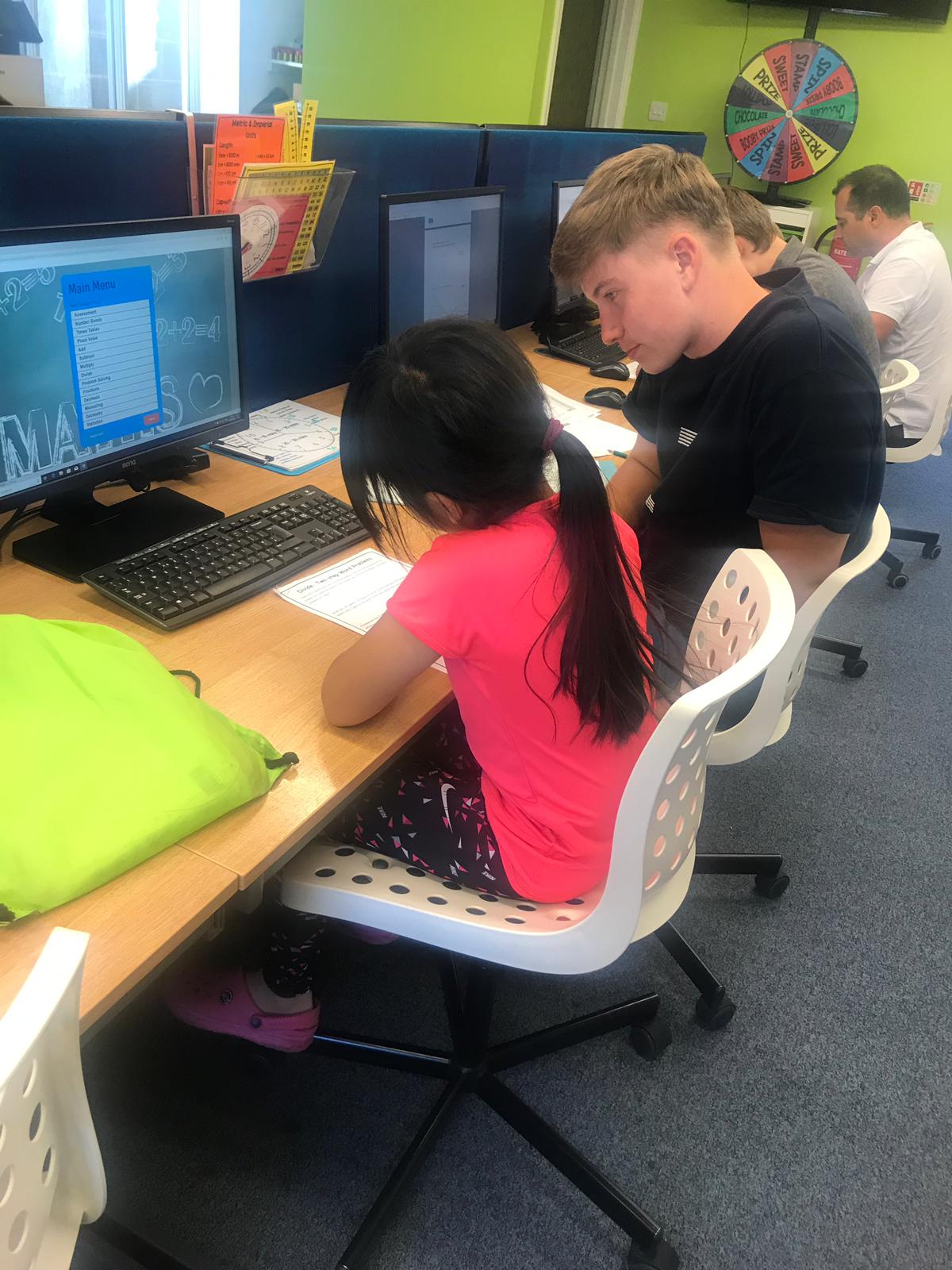
Understanding how children learn and memorise information can help us to improve their education.
The way that children’s brains are wired is completely different to adults, which is why children’s attention spans are typically shorter.
Have you ever wondered how you can improve your child’s attention span so that their focus can improve when learning?
Try our 3 effective ways to improve your child’s concentration:
Playing focus games
You can make learning fun by incorporating games into daily activities. Try playing card games like ‘Memory’ or puzzles like Sudoku or Crosswords, these will improve attention span as well as focus. If you take away electrical gadgets like smartphones and tablets it will be less distracting, allowing your child’s concentration to be solely on the activity.
Create a distraction-free zone
By creating a distraction-free environment, your child will have somewhere dedicated for studying and completing work. This is a space where they can focus on the task they are completing without being tempted by the TV, mobile phones or other distracting electronics. Create an environment that is comfortable and calming for your child so that it makes the tasks enjoyable. If they concentrate best by listening to calming music, then why not try putting on soft background music. Make sure everything that your child needs is accessible so they don’t have to get up and search for anything.
Set a routine
By creating a timetable for daily activities, your child will have a structure to follow and know what they need to complete. If there’s a set time for completing homework, having dinner and other activities like reading, it can help to program their mind so they are aware of what they need to get done. This will also help with time management and organisation!
You can help your child with their concentration skills a number of ways! Training children’s brains to focus is something that will benefit them throughout their life. Concentration can be improved through brain training games, creating a peaceful environment for completing tasks and setting a routine to follow.
Subtracting fractions in 3 simple steps

Fractions are a challenging subject to grasp in maths. Helping children with subtracting fractions doesn’t have to be a difficult task though…
Follow our top tips on subtracting fractions in 3 simple steps!
1. Basic rules:
- The top number is called the numerator.
- The bottom number is called the denominator. This can be remembered as ‘d’ stands for denominator and down, as it’s at the bottom.
- Whatever is done to the denominator, must be done to the numerator.
2. Subtracting fractions with the same denominators
- As the denominators are the same, all that needs to be done is subtracting the numerators.
Example:
2/3 – 1/3
2 – 1 = 1
= 1/3
3. Subtracting fractions with different denominators
- The first step is finding the common denominator of the fractions being subtracted.
- This means that the bottom numbers need to be the same,
- To do this, find a number that both bottom numbers go into – a multiple of that number.
- For example, if the denominators are 4 and 8, both of these are a multiple of 8.
- It’s important to remember that whatever is done to the denominator, must be done to the numerator.
Example:
7/8 – 1/4 (Make the denominators the same)
7/8 – 1/8 (Do the same to the numerators)
1 x 2 = 2
7/8 – 2/8
Now subtract the numerators.
7-2 = 5
= 5/8
Top tips:
- Try drawing out the equations so it can be visualised. You can draw it like a pie:
 so this represents 1/4
so this represents 1/4
 and this is 1/3
and this is 1/3
- Or try asking it as a word problem.
- For example, Jessica has 1/3 of a chocolate bar. She gives her brother 1/2 of this. How much of the chocolate bar does she have left?
Subtracting fractions in 3 simple steps has never been easier!
Firstly teach your child the basic rules, labelling the numerator and denominator.
When the denominators are the same, the numerator simply has to be subtracted to get the answer.
When the denominators are different, a multiple of both denominators needs to be found.
Once this is complete, the same must be done to the numerator. Finally, subtract the fractions!
For additional help with subtracting fractions, click here.
If you are interested with other maths activities, like teaching times tables, find out more here.
Helping children with their spellings
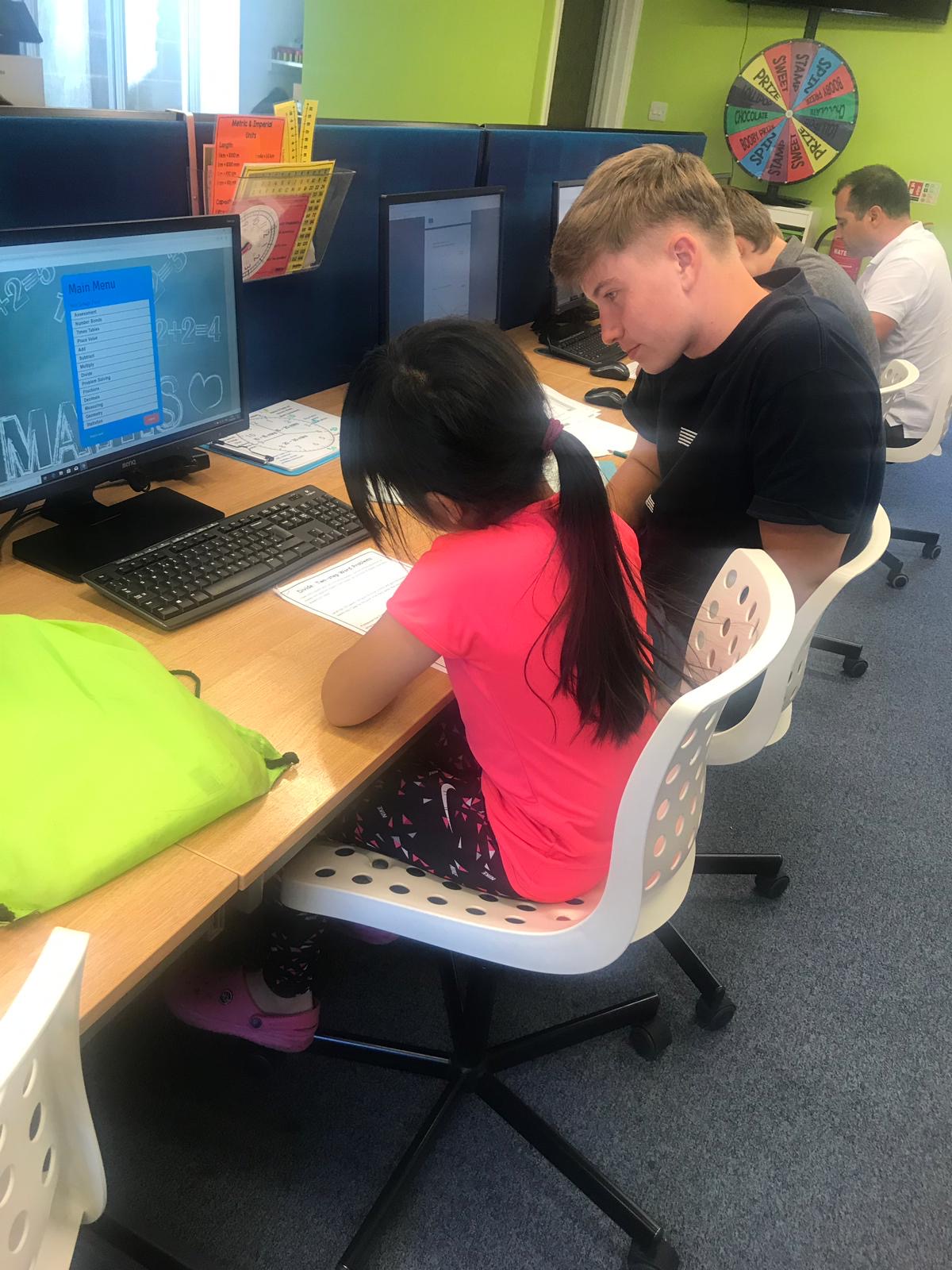
The English language can be challenging to grasp, especially for children learning how to spell. Helping children with their spellings doesn’t have to be difficult though!
Try these tips for making spelling that little bit easier for you child.
Learning letter patters
- I before E except after C. The letter i usually comes before e in a word, however there are a few exceptions to this rule, like seize, weird, science…
- It can be useful to teach children common word endings (called suffixes). Teaching the common word endings, like “-een” “-ough” “-tion” “-ue” “-cian” will help children to remember the spellings more easily.
- Some words don’t follow any rules or patterns so they have to be memorised, for example the b in ‘subtle’ is silent.
- Some double letters can’t be heard, like ‘accommodation’ and ‘disappoint,’ so learning the spellings for these is useful.
- Homonyms are words that sound the same but have different meanings, like ‘your’ and ‘you’re.’ These must be learnt as two separate meanings, to avoid confusion. The apostrophe in ‘you’re’ stands in place for ‘are,’ so this is a different meaning to the direct address using ‘your.’
Top tips:
- Reading: reading allows spelling to be learnt easily without realising, as well as improving vocabulary.
- Mnemonics: mnemonics involves using imagery or patterns, which ca help to remember spellings. Try learning acronyms, like ‘because’ can be remembered as as ‘Big Elephants Can’t Always Understand Small Elephants’, or the word ‘necessary’ has one c and two s’, which can be remembered by comparing it to a shirt, which has one collar, one c, and two sleeves, two s’.
- Spelling lists: create a new spelling list every week and test your child on it. You can make this fun by creating themed spelling lists, for example one on seaside-related spellings. Writing out the spellings over and over again, especially the incorrect ones, will help with memorising and perfecting them. It may be beneficial to keep a list or notebook to record all the spellings that have been learnt, then you and your child can return to the list to recap.
- Sounding out words: sounding out difficult words can help to break them down when spelling them, like February can be broken down into Feb-ru-ary, or Wednesday can be Wed-nes-day.
Helping children with their spellings has never been easier. Learning spelling patters and rhymes allows certain spellings to be remembered with ease. For some tricky spellings, there is no pattern, like words with silent letters – so these ones have to be memorised. Testing your child on their spellings by giving them weekly spelling tests will help them to remember spellings and letter patterns. For those tricker spellings, make a note of them and go through them together until they are perfected!
Click here for a list of challenging spellings to test your child on.
3 ways to engage children with learning
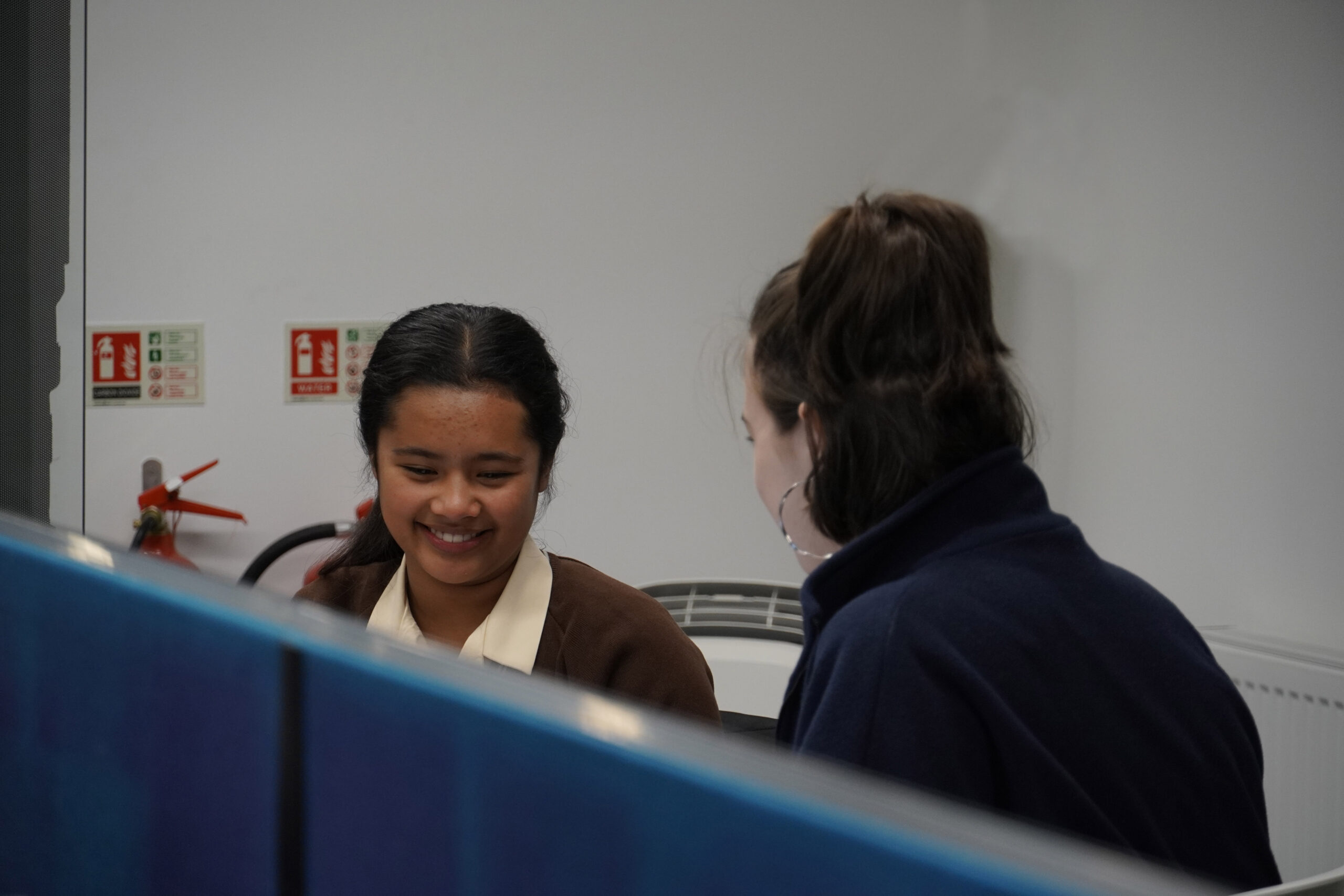
Keeping children’s focus and maintaining their full attention can be challenging when it comes to learning. This is because not all children will be motivated in every subject they do. This is why trying a range of techniques can be useful for maintaining interest with the topic being taught.
Here are 3 ways you can engage children with their learning:
Monitoring your child’s progress
Going through work with your child that they are currently working can help keep on track with their progress. Perhaps try talking to them about their day at school. Ask questions like:
- What did you learn?
- What did you think about the topic?
- Did you find it challenging or easy?
Anything they struggle with you can recap together. This will help your child to understand the subject as well as reflect upon their learning.
As well as reflecting on the challenging material, ask them what their favourite subject(s) are. You can encourage and motivate them in what inspires them, too!
Rewarding efforts with positive encouragement
Children are constantly learning and like to be rewarded when they’ve been working hard. Helping them recognise that they are progressing with learning and doing well will encourage them in education.
Rewarding can be given in many forms, either something tangible like a treat or in verbal praise, maybe an activity or day out.
These rewards can also vary depending on what has been achieved, for example verbal praise can be given when they have aced a spelling test. Something larger, like a fun day out can be for achieving top marks in an exam or a positive report card.
Different learning approaches
Discover whether your child learns best through auditory, kinaesthetic or visual learning. Auditory learning concerns learning through hearing, whether it’s listening to music which aids the learning process or repeating study notes aloud. Kinaesthetic learning is learning by doing, this could be acting out something or creating something, like colour coded notes. Visual learning when the learner helps by seeing what is being taught. This type of learner can write out notes, create a poster or draw.
Knowing how your child learns best is a step towards engaging them with learning. Everyone has a unique way of learning so identifying how your child learns most effectively will make learning fun and achievable. Keeping on track with their learning by knowing what they are being educated in and asking them how they feel about the material. This will help to identify which areas they need help in and offer positive encouragement to reward when they are doing well.
If you’re looking for other strategies to help with your child’s learning, like how to mitigate your child, read more on our blog here!
If you’re interested in the 3 ways to engage children with learning, read more about learning engagement theories here.
Making learning fun for children

Homework and studying are a constant in every child’s life. It may seem like a chore, especially when the subject area is challenging. That’s why making learning fun for children is an easy solution, in order to engage with content and making the workload enjoyable.
Try following one of these tips to make learning fun!
Hands-on activities
Doing creative and hands-on activities will help to engage children through interactive learning. Activities can be tailored to the child’s interest, turning a chore into a fun activity.
Let them take control
Letting children take control of the activity or task will help them become more invested. This will enable the child to create their individual approach to learning, with their own, unique style. Motivate them in the subjects they are interested in and guide them in the ones they are finding difficult.
A visual approach
Make learning more visual through integrating colours, felt tips, paint – various arts and crafts, for a more hands-on approach. This will make the tasks engaging and exciting, so the child will want to participate!
Additional tuition
Our tutors at StudyBox believe in making learning fun for children, through activities and tailored sessions to the child. We use a range of approaches and monitor progress, boosting those grades whist making learning that little bit more enjoyable!
Call us on 02086428884 for a chat with one of our friendly tutors. To book a free trial with StudyBox, sign up here!
GCSE Revision Schedule
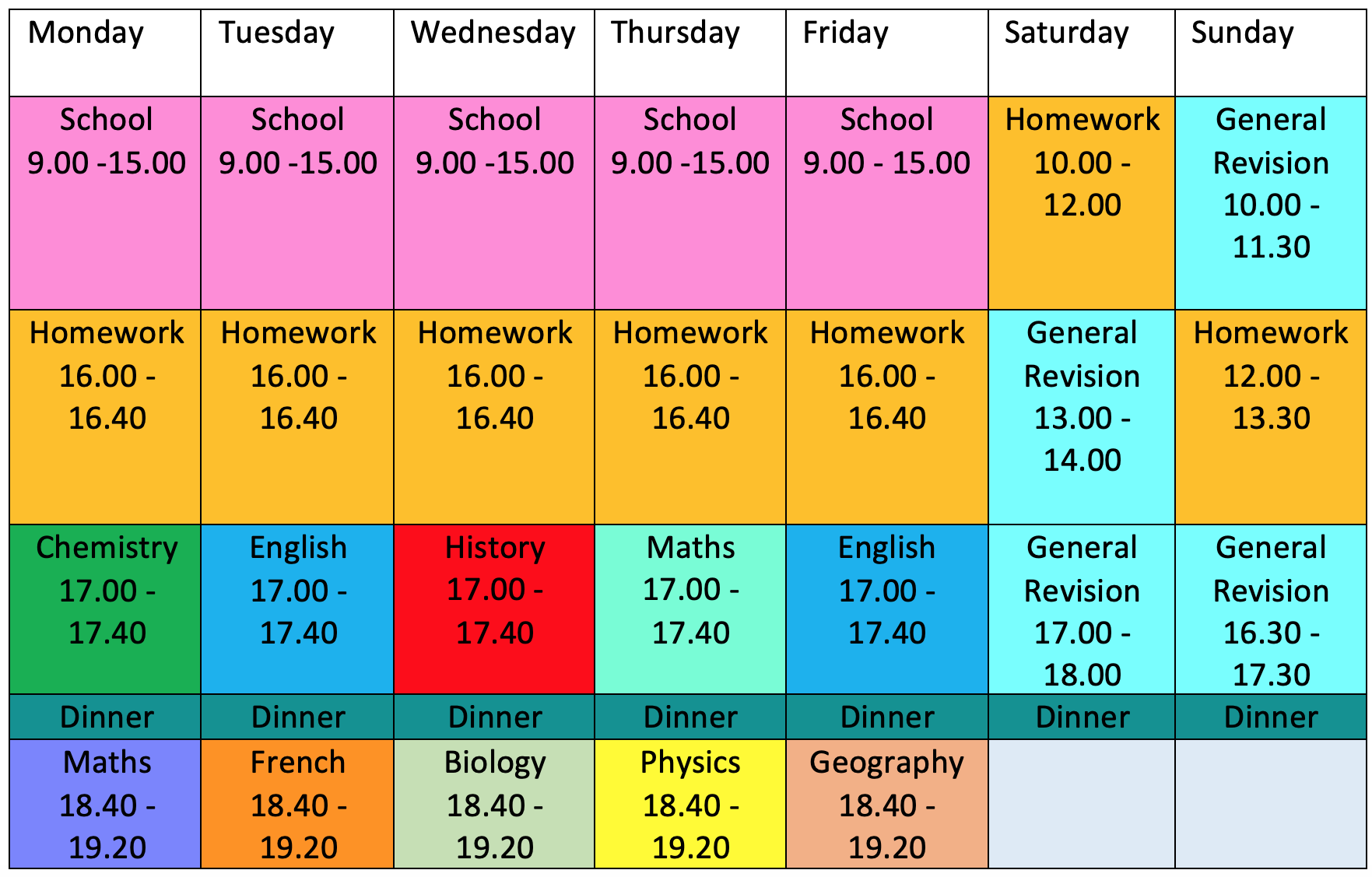
For students in year 11, GCSEs are the most challenging year in your life so far. Time management and creating a GCSE revision schedule is encouraged if you want to be on track to hit those predicted grades.
Follow these top tips to make this year that little bit easier for you and manage your time effectively:
Key Dates
Note down all key dates, for exams, mocks, deadlines, and so on. This way, you are prepared for everything in advance and can plan and organise your time around these important academic dates. There may be quite a few dates, so colour coding can help to organise them. For example, mocks can be in one colour, and exams in another, to differentiate.
Create a poster
Posters are a visual way of displaying important information, from key dates to revision notes. You can purchase A3 paper and display it in a large poster format somewhere visible, like the kitchen or on a bedroom wall, where you will regularly see them. For a revision poster, you can choose which topics and modules you’re going to study and stick to it, so that it’s easier to break down each subject. Leave blank time-slots on the timetable to go back to any topics that were difficult, or for testing yourself and going through what you’ve learnt.
Managing time
Decide how you are going to divide your revision time between subjects. You can choose which subjects require more attention, if necessary, or divide time equally. Make a list of strong topics and weaker topics, then decide how much time to dedicate for each one, and prioritise the more difficult subjects. Also consider how much material there is to learn for each subject, whether the subjects are essay-based and take longer writing out, and how progress is from feedback and recent test results.
Study space
Find a place that you concentrate best, and stick to completing your homework and revision here. Whether it’s the library or home, or maybe even a coffee shop, different people learn in different ways. You may find you prefer a busy or quiet environment, so find which way works best for you and stick to it.
Additional tuition
If there are certain areas that you are struggling with, perhaps consider attending after school tuition. StudyBox provides 1-1 support in GCSE maths, English and science. We have friendly tutors who are willing to help you to achieve your predicted grades!
To make your GCSE revision schedule a little more manageable, book a lesson with StudyBox today on 02086428884. Alternatively, sign up here for a free trial!
How to give your child an extra boost with learning

A child’s most important role model and teacher is their parent. A parent takes on board many job roles, asides from providing for their child, they are also responsible for educating and eventually preparing their child for the real world. In order for parents to give their child an extra boost with learning, it is important that they are well acquainted with their child’s timetable, in order to support them academically throughout their time at school.
Follow these tips on how to keep up-to-date with your child’s learning:
-
Monitor progress
Stay in the loop with your child’s progress at school. This will allow you to support them in difficult subject areas and encourage them with subjects they are progressing in. Ask them what went well with their day and what they are finding more challenging. Follow up on this by giving them an extra boost when needed and rewarding progress.
-
Stay connected
Stay connected with your child’s school by getting to know their teachers and going to all parent-teacher conferences. Ask the school what you can do to help your child if they are struggling in any areas. Attending every parents evening will further keep you up to date, through discussing progress between the parents, teacher and child. Checking regular report cards will give an indication as to where your child is academically, based on mock exams and in-class tests.
-
Keep up to date
Knowing their timetable and upcoming tests and exam dates is necessary for monitoring progress. This will ensure your child stays on top of revision and fully prepares for important exams.
-
After school assistance
Helping your child prepare for exams is necessary for giving them that extra boost in school. Statistics show that you are 50 percent more likely to remember something you’re revising by saying it aloud. Perhaps try reciting the material together and testing your child on the syllabus through a question and answer format. Help with homework and ensure this is completed by the deadline. Also encourage extra-curricular activity, like leisurely reading, online educational activities and sports.
-
Arrange additional help if needed
Being a parent is a full-time job; sometimes it is difficult to find the time to support your child whilst balancing everything else. Attending after-school tuition will establish a routine in a learning environment and free more time in a busy parent’s schedule, in order to give your child an extra boost with learning. StudyBox Tuition provides one-to-one support in maths, English and science, tailoring lessons to the individual and building skills and confidence.
StudyBox has centres in Croydon, Sutton and Wallington, with two new centres opening soon in Epsom and Battersea. You can book a free trial here. Alternatively, call one of our centres to find out more, on: 02086428884.
How to get a head start in September

Are you wondering how to get a head start in September for your child?
Starting the new academic year can be stressful. Especially for students going into Year 10 and 11, about to start their GCSE preparation and exams. It can be daunting not knowing what to expect.
Beginning GCSE preparation as early as possible is essential for receiving good grades. Here are some useful tips for succeeding in exams.
Attend additional tuition
After-school tuition at StudyBox provides one-to-one support and customised lessons to each child. Therefore, our tutors are able to evaluate and focus on which areas that the student finds difficult. The sooner the student starts revision, the better they are able to grasp the topic. StudyBox offers GCSE, SATs and 11+ tuition.
Short, regular study intervals
A study by Dr. Dave Haylock shows that regular revision in short intervals is the most effective way to revise. ‘Revise little but often,’ Haylock suggests, which will also reduce stress. This effect is known as “spacing,” which allows the material to be remembered again once revisited.
Start revision early
Dr. Cecile Brich says it is vital to ‘start your revision early.’ Keep up with the workload and make notes as you go. Remember to write clear notes in class and build on these notes using revision guides. ‘This is not something you can do well by cramming the night before. Working regularly and keeping notes up to date makes revision much more effective and much less stressful,’ Dr. Brich advises.
Set a timetable
A revision timetable is an effective way to keep organised and on top of revision. Dedicate a few hours per day for each subject and stick to it.
Find a method that suits you
Everyone learns differently. If you are unsure how to revise, test these different methods until you find what works best for you:
- Mind map: Write the subject in the middle, then the topic coming off the first branch. Branching off from this, write keywords and bullet points to trigger the material.
- Colour coding: Write the topic as the heading and subtopics underneath. Bullet point the material in short sentences. Use different colour pens or highlighters and colour code each topic.
- Flashcards: Write each topic on a flash card. Bullet point the information underneath each topic. Read the cards throughout the day and take them with you wherever you go.
- Reciting: Ask a relative or friend to test you on the material, having you repeat the information back to them.
Break down each subject
The GCSE syllabus consists of multiple subjects, each containing in-depth material to revise. In order to make the workload bearable, it is recommended to break each subject down into topics. This way, the workload seems less daunting and each topic can be ticked off a list once completed. It is also easy to return later to the topics that are more challenging.
If you want to get a head start in September, sign up for StudyBox today! Book your free trial here. Alternatively, call one of our centres in Croydon, Sutton or Wallington on: 02086428884
GCSE Results Day 2019
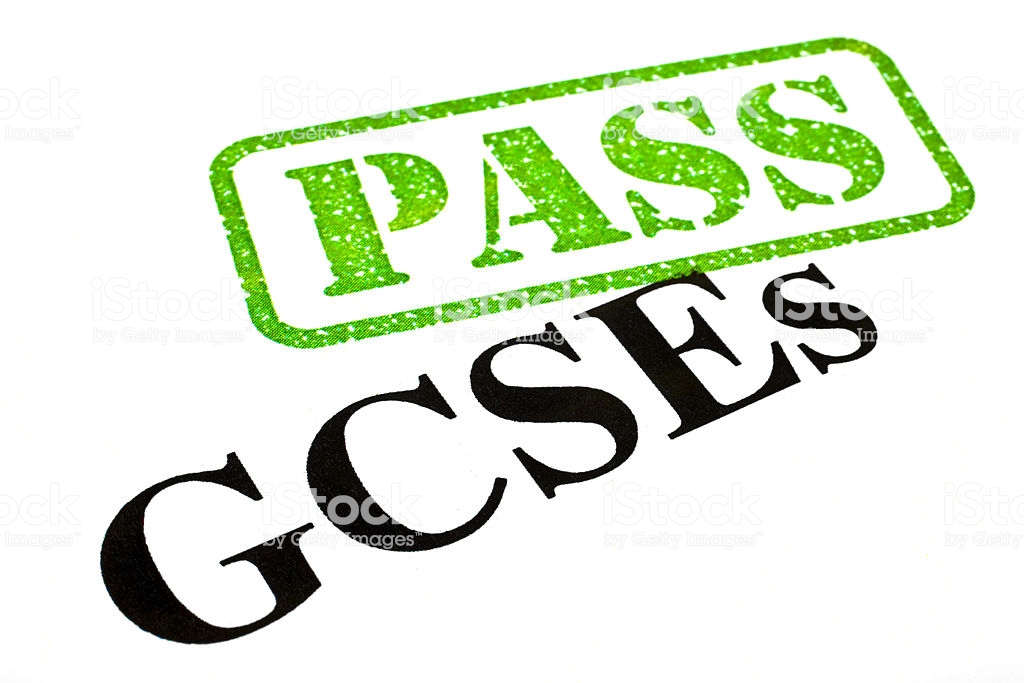
GCSE results day this year falls on Thursday 22ndAugust 2019.
This week, students across the country awake with anticipation to find out what grades they have received in their GCSE exams.
Students can collect results from their school on the morning, usually from 10am. Results can also be received via email from 8am, if requested from the school.
What is the importance of GCSEs?
GCSE results signify the end of secondary education and determine the next step. Whether it’s continuing higher education and starting A Levels, doing an apprenticeship, or going into full-time work, there are plenty of options.
What happens when my child receives their GCSE results?
On GCSE results day 2019, students will find out whether they’ve received their predicted grades and have been accepted into their 6th form or college of choice, should they wish to continue into higher education. They will also find out whether they are accepted onto their chosen A Level subjects.
Back-up options are also selected when applying for 6th form or college. This is in case a student doesn’t receive the predicted grades to get accepted into their first choice.
New GCSE Grading System
This is the second year that the numerical grading system has been implemented. Grades rank from 1-9, (where 1 is the lowest and 9 highest), in order to differentiate amongst the brightest students. Read more about it here.
What if my child doesn’t receive their predicted grades?
If a student doesn’t achieve their predicted grades, there is no need to panic – there are plenty of other options available. Contacting the 6thform or college and finding out about other options is advised. Sometimes, the institute will accept lower grades, or offer an alternative subject to study. Another option is requesting a paper remark from the exam board, at a charge. This comes with a risk of the grade being marked lower than the original received grade, however. If a student thinks they have been marked incorrectly, they can appeal an exam result. This can be done by asking the school to get the result looked at again, or requesting it from the board themselves.
Alternatively, exam resits take place in November 2019. Asking the school for information about exam resits is the best way of finding out the details. StudyBox offers tuition for GCSE resits in November, simply call one of the centres in Croydon, Sutton or Wallington to enquire.
If none of the above options are possible, it could be worth changing a career plan and exploring something new, like doing an apprenticeship or considering BTEC qualifications.
Good luck to everyone on GCSE Results Day 2019! But if the results were different to what was expected, don’t panic. There are always plenty of other options to consider.
Call StudyBox today on 02086428884 or sign up online for a free trial!
International Youth Day 2019

International Youth Day 2019 brings to attention the 1.8 million young people in the world. This is the largest youth population there has ever been, making a sixth of the human population.
From this figure, 1 in 10 of the world’s children live in conflict zones. 24 million are out of school. As a result of this, there is an increasing isolation of youth in societies, due to conflict and political instability. It is easy to forget that education is a privilege which not everyone has access to.
The 2019 theme of International Youth Day is ‘Transforming Education.’ At StudyBox, we believe that education is imperative for paving a better future. This is why we support, motivate and challenge our students to help them get where they want to be.
This year’s Transforming Education theme highlights efforts to make education more inclusive for all, including efforts from youths themselves.
Education is necessary for diminishing poverty, achieving gender equality and improving job prospects. As a result, the government, youth and youth-led organisations are working together. They aim to transform education into a fundamental tool for all.
Currently, “only 10% of people have completed secondary school education in low income countries.” Moreover, “40% of the global population are not taught in a language they speak or fully understand.” (United Nations)
Quality education plays a crucial role in youth development, which is why constant learning from a young age is important for shaping and growing the individual. StudyBox offers maths, English and science tuition, as well as a coding course. Our courses include the 11+, GCSEs, SATs, mocks, which is all important for paving the path to the next step in life, be it secondary school or GCSEs.
